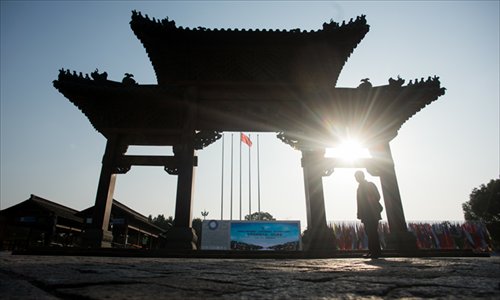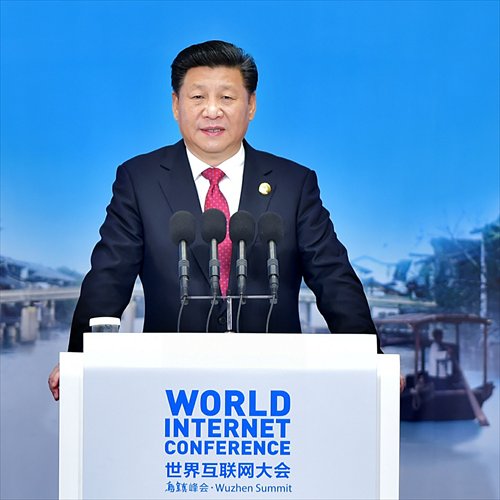No Internet hegemony: Xi
President urges respect for cyber sovereignty

A security guard stands next to the entrance gate of the scenic town of Wuzhen in East China's Zhejiang Province, which plays host to the World Internet Conference, on Wednesday. Photo: AFP

Chinese President Xi Jinping speaks at the opening ceremony of the World Internet Conference on Wednesday in Wuzhen, Zhejiang Province. He called on all nations to respect the Internet sovereignty of each other. Photo: Xinhua
Chinese President Xi Jinping on Wednesday called on all nations to respect cyber sovereignty and not engage in "Internet hegemony," while urging complementary cooperation in cyberspace so more people can benefit from the opportunities brought by the Internet.
"We should respect each other's right to choose our own development paths and Internet governance models," Xi said at the opening ceremony of the annual World Internet Conference in Wuzhen, East China's Zhejiang Province.
"No country should pursue cyber hegemony, interfere in other countries' internal affairs or engage in, connive in or support cyber activities that undermine other countries' national security," he said.
Xi said that sovereign equality, one of the basic norms in contemporary international relations enshrined in the Charter of the United Nations, should also be applicable to cyberspace.
More than 2,000 delegates from over 120 countries and regions are attending the event from Wednesday to Friday, which covers topics ranging from Internet governance and cyber security to e-commerce and cyber culture.
This is the second World Internet Conference in Wuzhen, and Xi's first appearance at the event.
The president listed "imbalanced development, inadequate rules and inequitable order" as problems and challenges facing the Internet.
Xi then urged "reform of global Internet governance," as he noted that all countries should foster "a peaceful, secure, open and cooperative cyberspace."
New model of governance
Huang Rihan, a research fellow with the Maritime Silk Road Institute at Huaqiao University in Fujian Province, told the Global Times that it is necessary for China to propose a new model of Internet governance as it grows to become a "strong Internet power" and it is also part of its responsibilities as a major world power to offer new ideas in governance.
There are now two major Internet governance models, one represented by the US, which advocates so-called open and free principles, the other represented by China, which insists on cyber sovereignty, Huang said.
"China's experience is based on regulation of cyberspace activities within the rule of law," said Huang. "China insists that the security and freedom of cyberspace can only be guaranteed when order is maintained."
"We should respect Internet users' rights to exchange their ideas and express their minds, and we should also build good order in cyberspace in accordance with the law as it will help protect the legitimate rights and interests of all Internet users," Xi said Wednesday, stressing that cyberspace is not "a place beyond the rule of law."
Shen Yi, an associate professor of international studies at Fudan University in Shanghai, said that cyberspace does not need hegemony or a hegemonic country, but it is in need of a system of order or regulation, which will further support Internet development and bring benefits.
"Whether some Westerners recognize it or not, China has been exploring its own path of Internet governance, which meets the demands of the development of its Internet in a market economy," Shen told the Global Times.
Such a path has enabled domestic Internet companies to grow strong, and in the meantime, international Internet giants are also eager to get a share of the Chinese market, he noted.
The more the US emphasizes its concept of "Internet freedom" and tries to bind its national interest with the Internet, said Shen, the more other countries may be forced to adopt regulations on the Internet to protect their own interests. "The Internet should become a real public sphere instead of a tool of the US," he said.
Shen added that China should also find a proper way to exercise its cyberspace sovereignty rights to further open up and utilize the Internet.
Internet for all
The president also called for efforts to speed up the building of global cyber infrastructure so that more developing countries and their people can share the development opportunities brought by the Internet.
"It has brought an opportunity for China's 'Belt and Road' initiative construction, one of whose key focuses is to promote cross-border cable construction to upgrade communication," Huang said.
Xi also said that the robust growth of China's Internet has provided a big market for enterprises and business start-ups in all countries, pledging that China will remain open to foreign investment and guarantee foreign companies' legal rights.
"Safeguarding the legal rights of foreign-invested businesses will not change," said Xi. "As long as China's laws are respected, we warmly welcome companies and entrepreneurs from all countries to invest in China."
With around 670 million users and over 4.13 million websites in China, the Internet and economic and social development have become intrinsically linked, Xi said.
Xinhua contributed to this story